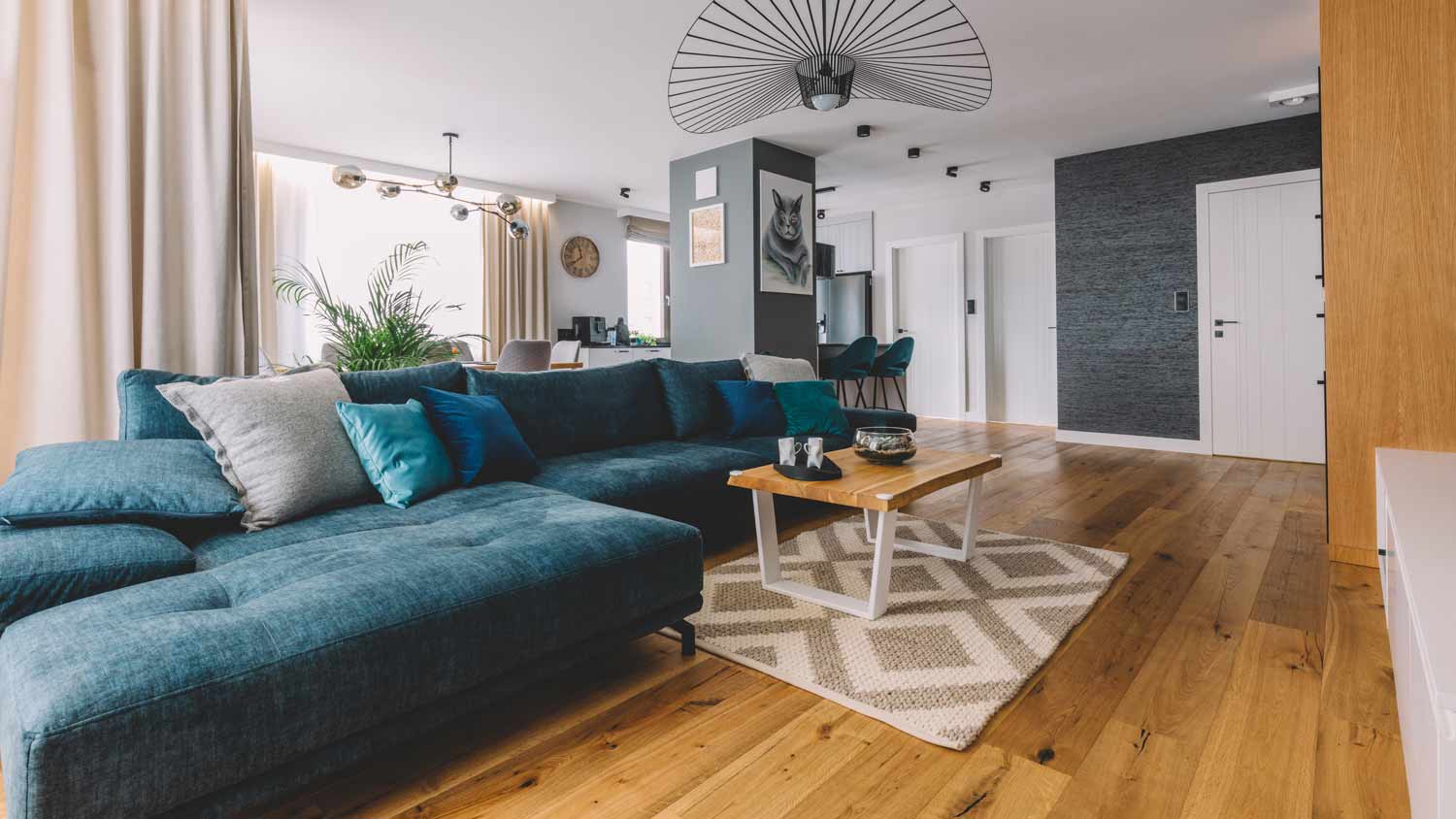Bamboo Flooring vs. Hardwood Flooring: Which One Is Right for Your Living Space?
You’ll be floored by all the benefits of both of these materials


Bamboo flooring is made from a hardy, tropical grass and costs $2 to $20 per square foot for materials and labor.
Hardwood can come from a variety of tree species, like oak or maple, and costs $6 to $25 per square foot.
Hardwood lasts longer, sometimes more than a century.
Bamboo grows quickly, making it more sustainable and less expensive.
Both materials can be challenging to install, so it’s best to call a pro for help.
Wood (or wood-like) flooring is a popular choice for high-traffic areas, like living rooms or primary bedrooms, because it offers strength and durability you might not get with laminate or carpet. But you have to choose from a variety of options, including classic hardwood and eco-friendly bamboo. Before you purchase your new floor, consider all the perks and drawbacks of bamboo flooring versus hardwood.
Bamboo Flooring vs. Hardwood: Key Differences

While they both look like types of wood flooring, bamboo is actually a grassy plant that grows rapidly. This rapid growth means bamboo is considered a more sustainable material that often comes at a lower cost compared to hardwood.
Another major difference between these two flooring types is their life spans. While both are hard and durable, bamboo tends to last years or even decades less than hardwood. One of hardwood’s other biggest perks is that it comes in such a large range of appearance options.
What Is Bamboo Flooring?
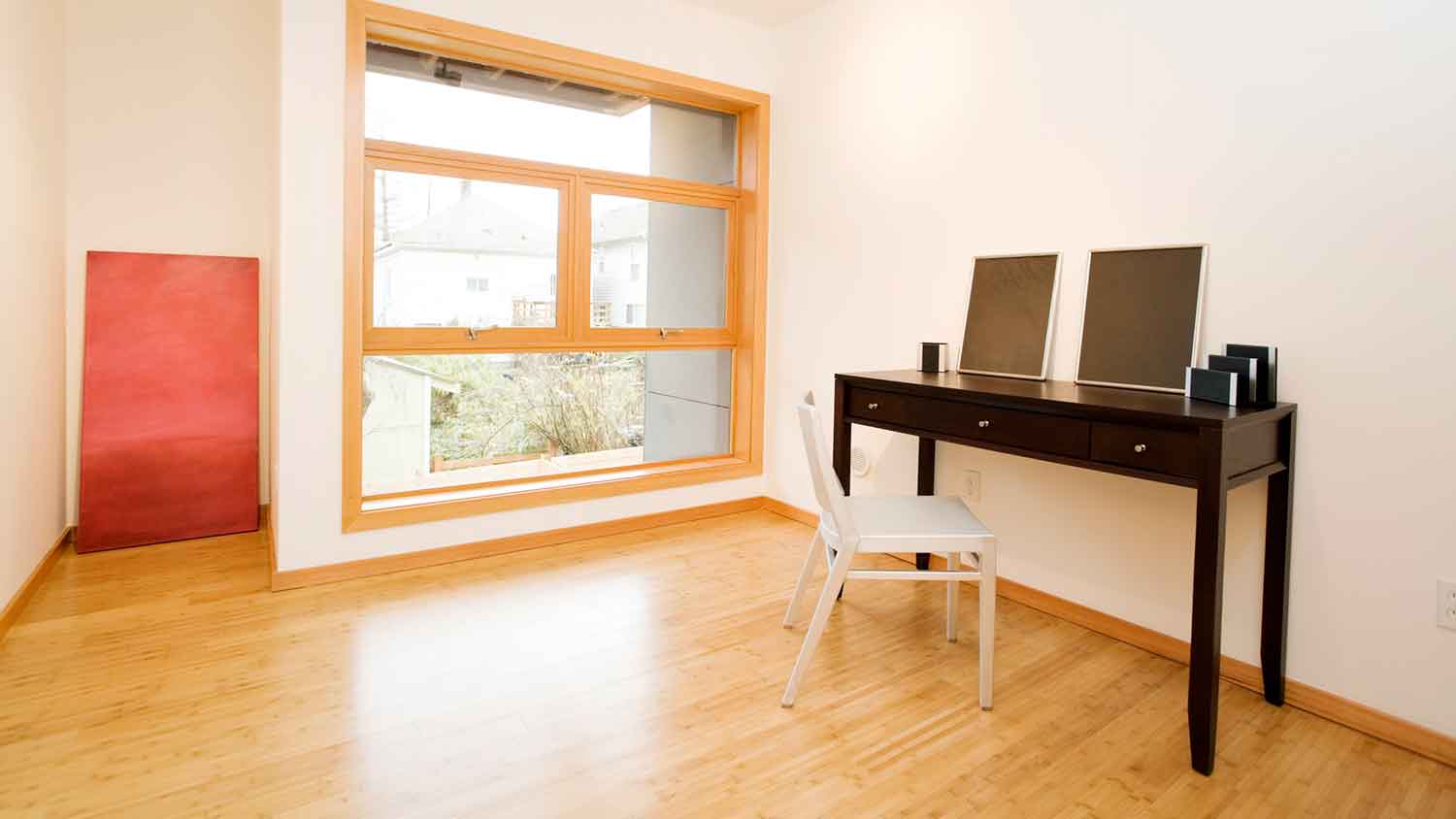
Bamboo flooring is, unsurprisingly, made from bamboo: a dense, fast-growing grass commonly found in tropical climates. Bamboo can grow up to 1.5 inches per hour, making it a sustainable and renewable resource. This hardy grass is cut at the stems and processed into planks, which is why bamboo flooring can often resemble the look of hardwood. From there, it can be carbonized for a darker color.
| Pros | Cons |
|---|---|
| Eco-friendly | Fewer visual options |
| Lower price | Shorter life span |
| Strong and durable | Sensitive to moisture |
Best for:
Areas with low humidity and low risk of water spillage
Homes with kids and pets
Households prioritizing sustainable materials
Pros of Bamboo Flooring
Because bamboo is a fast-growing plant, it’s more sustainable to grow and harvest and an eco-friendly flooring option. The fast growth rate also helps lower the cost of bamboo flooring because the supply can regrow quickly.
Despite being a type of grass, bamboo is impressively strong. It’s harder than some types of hardwoods, such as oak or cherry. It has a strength similar to steel, so it can stand up well to dents, scratches, and wear and tear.
Cons of Bamboo Flooring
Although the price and durability are major perks, bamboo flooring isn’t without its drawbacks. This material doesn’t offer as many customizations or options for colors and textures compared to hardwoods, so you may find it doesn’t quite match the vision you had in mind for your living space.
Despite its durability, bamboo isn’t moisture-resistant. So, if you spill anything on a bamboo floor, you need to wipe it up quickly. This also means that bamboo flooring may not be the best option for humid rooms, like a bathroom. Keep in mind that bamboo lasts 25 years on average, while hardwood floors can last over 100 years.
What Is Hardwood Flooring?
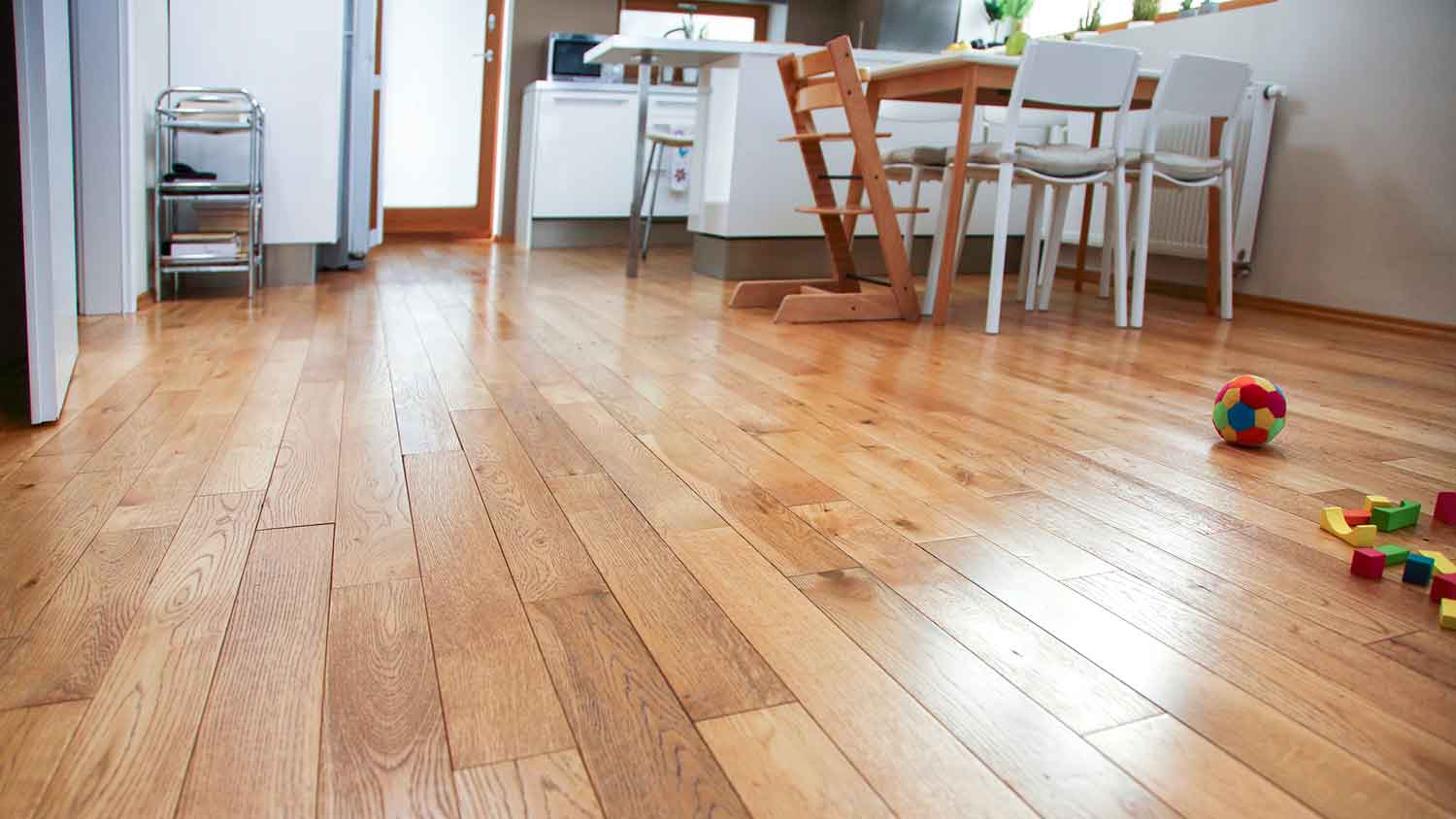
Hardwood flooring is made from any species of hardwood trees, such as oak, maple, cherry, walnut, and beech. Hardwood trees may take 20 to 150 years to mature enough for harvest, after which a manufacturer will process them into planks for flooring. Hardwood flooring has been around since the 1600s, becoming more widespread in the late 1800s to early 1900s, and it’s a durable material that can last over 100 years with proper care.
| Pros | Cons |
|---|---|
| Long life span | Less sustainable |
| Wider variety of appearances | More expensive |
| Reliable grading and ratings | Not pest-resistant |
Best for:
Homeowners who want to achieve a specific look in a room
Homeowners who don’t want to replace the flooring again for many decades
High-traffic areas
Pros of Hardwood Flooring
Hardwood flooring is one of the most popular floor choices for good reasons. When they’re well-maintained, hardwood floors can last for multiple generations. Because it’s been around for a long time, hardwood also has a more robust grading and rating system compared to bamboo, so you can more easily find the highest quality hardwood for your projects.
Another benefit of hardwood is that it has more choices in terms of appearance. You can find many different colors based on what type of hardwood you choose, from warm-toned cherry or red oak to cool-toned ash or white oak. There are even varying grain patterns in each wood for a truly one-of-a-kind look.
Cons of Hardwood Flooring
Hardwood is a renewable material, but growing and harvesting hardwood trees is a much slower process than for bamboo. This also means hardwood flooring tends to come at a higher cost when compared to fast-growing bamboo.
Another thing to consider when shopping for flooring is that while bamboo is naturally pest-resistant, hardwood flooring can end up as a home for pests like termites, carpenter ants, or powderpost beetles.
Bamboo Flooring vs. Hardwood Flooring
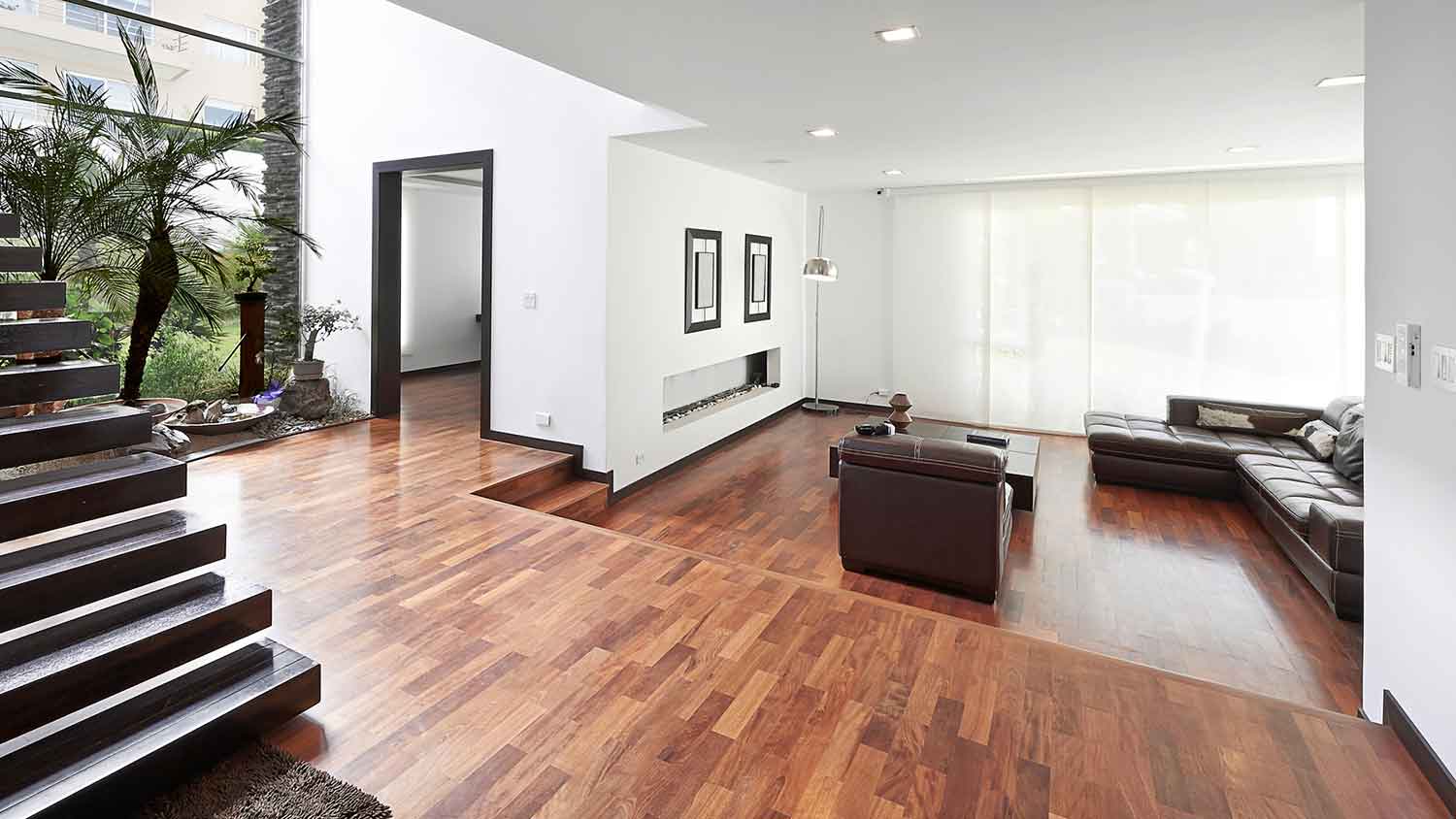
Choosing between bamboo flooring versus hardwood may seem difficult since each material has its own unique benefits and weak points. Fortunately, no matter which you choose, both bamboo and hardwood are great options for upgrading your home with a durable, long-lasting material. Here’s how these two popular flooring options compare:
Options and Customizations: Hardwood
Hardwood comes in so many natural color and texture variations since it can be sourced from a wide variety of tree species. Not only that, but you can also opt for a range of finishes, including different stains, that change the look of your hardwood floors. No matter what room or style you’re renovating, there’s a hardwood to suit your preferences. Bamboo can be a stunning material, but it naturally comes in a lighter shade that may not work with all spaces.
Durability: Tie
When considering whether to buy bamboo flooring versus hardwood, make sure to check the hardness of the specific flooring product you buy. Bamboo is pretty strong, and it’s harder than some popular hardwood floors, like oak. However, there are also hardwood flooring types that are stronger than bamboo, including red walnut and Brazilian teak. No matter which flooring material you choose, you can rest assured that the floor will be pretty hardy and stand up against dents and other damage.
Price: Bamboo
Because of how quickly it regrows, bamboo costs less than hardwood flooring. Bamboo flooring costs $2 to $20 per square foot for materials and labor, while hardwood flooring costs $6 to $25 per square foot.
Ease of Installation: Tie
Installing bamboo or hardwood flooring requires acclimating the material by letting it sit open in the room for 48 hours, inspecting and repairing or installing new subflooring, and using glue, nails, or click-and-lock planks to install the floors into place. While a savvy DIYer may be able to tackle installing bamboo or hardwood flooring, you’ll get better results by hiring a local flooring company for this home improvement project.
Maintenance: Tie
Both hardwood and bamboo require similar levels of care. Sweeping or vacuuming the floors weekly, cleaning up spills immediately, and rubbing away scuffs as needed are important for maintaining the look of both hardwood and bamboo floors. Both materials also need refinishing from time to time when they begin looking especially worn from scratches.
Length of Life: Hardwood
You’ve settled into your forever home, and now you’re looking to make sure it looks as good 50 years from now as it does today. If you want a material with better longevity, opt for hardwood. Hardwood lasts anywhere from 30 years to over 100 years. Although bamboo flooring has a longer life span (about 25 years) than vinyl or carpet, it doesn’t last as long as hardwood.
Sustainability: Bamboo
Bamboo is more sustainable because it’s a fast-growing plant. Hardwood, on the other hand, can take decades to grow to maturity. While bamboo is more sustainable for its rapid growth, keep in mind that it requires more energy to manufacture bamboo into flooring compared to hardwood, so it isn’t perfect. Still, it’s a good flooring option for eco-conscious homeowners.

.jpg?impolicy=leadImage)

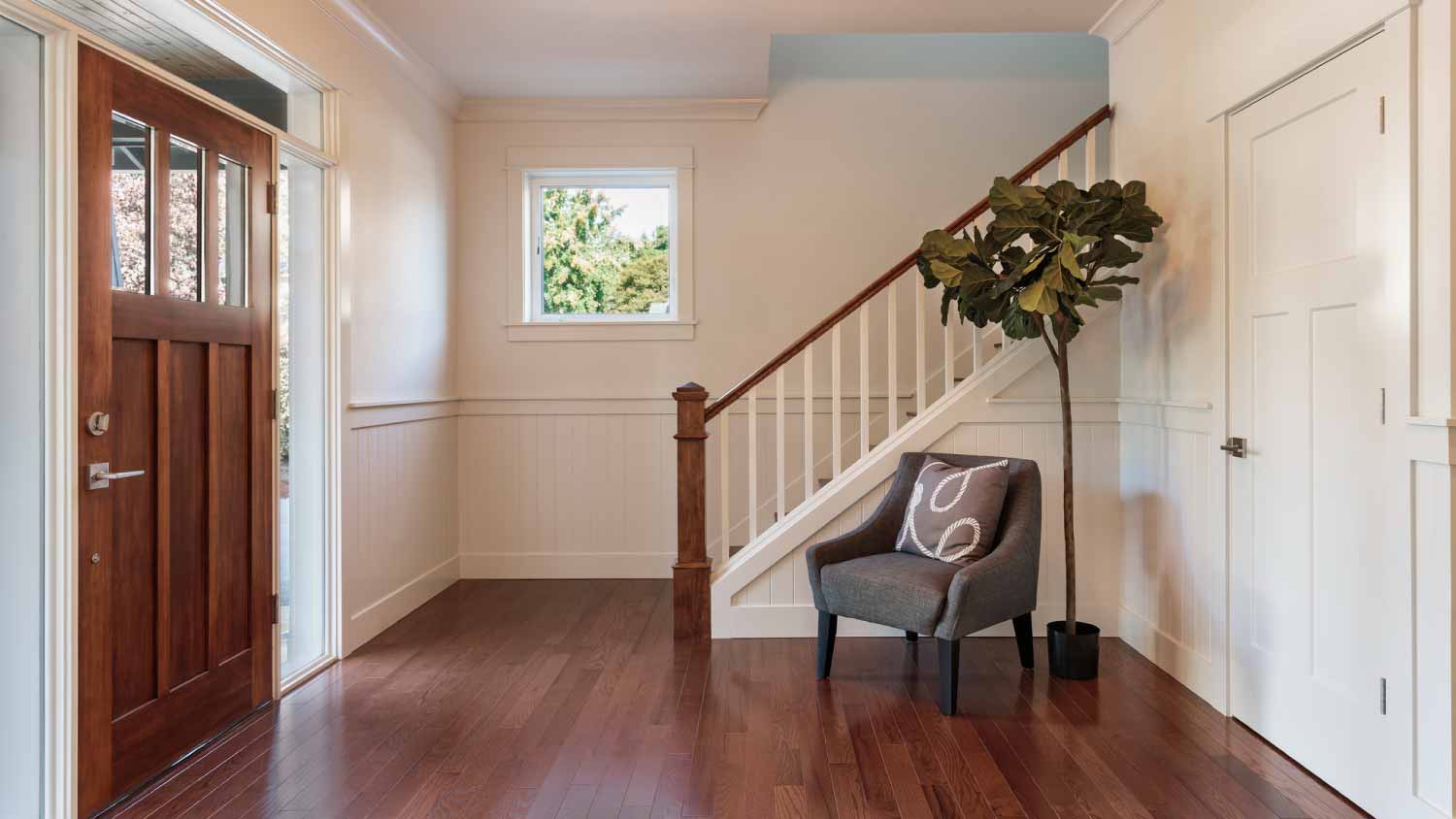

- Pros and Cons Bamboo Flooring in Your Home
- Bamboo Flooring vs. Laminate: Which Is Best for You?
- Can Bamboo Flooring Be Refinished? What You Need to Know
- How to Plant Bamboo: Care, Cost, and Containment Tips
- A Homeowner’s Essential Guide to 5 Types of Bamboo Flooring
- How to Kill Bamboo Roots: A Complete Guide
- What’s the Best Flooring for Kitchens? Explore 10 Top Picks
- Hardwood Flooring Installation: Why You Should Leave it to Professionals
- The Best Flooring Options for Dogs: A Complete Guide
- How to Choose Hardwood Flooring in 7 Simple Steps



